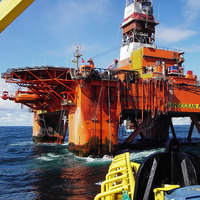On Jan. 14, two of the world's oil giants, Russia's Rosneft and BP, announced an unprecedented "strategic global alliance," in which they will be exchanging shares and expanding their joint ventures, including launching a new Arctic oil-drilling project. Both companies bring important assets to their new alliance, but the deal has alarmed foreign governments and environmentalist organizations due to its potential commercial, security, and ecological implications. The arrangement also raises interesting questions related to the Russian government's economic modernization program.
Through the deal, Rosneft will acquire 5 percent of BP's shares, while BP will obtain an additional 9.5 percent share of Rosneft, bringing its total stake in Rosneft to 10.8 percent. The deal will further tighten the unusually close ties between one of the world's largest private-sector multinational oil companies and an energy corporation owned by a national government. BP's oil production is currently 3.5 million barrels per day (bpd), more than four percent of the world's oil production, while Rosneft produces 2.5 million bpd.
The new partnership will further expand BP's activities in Russia, which has surpassed Saudi Arabia as the world's largest oil producer. BP already has a larger presence than any other Western energy company in Russia, currently producing about one-quarter of its total oil output there.

